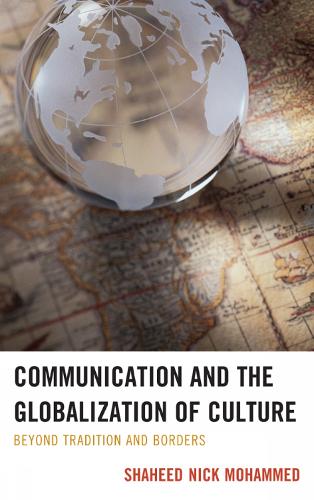
Communication and the Globalization of Culture: Beyond Tradition and Borders
(Paperback)
Publishing Details
Communication and the Globalization of Culture: Beyond Tradition and Borders
By (Author) Shaheed Nick Mohammed
Bloomsbury Publishing PLC
Lexington Books
14th December 2012
United States
Classifications
General
Non Fiction
Communication studies
Globalization
303.48209
Physical Properties
Paperback
210
Width 150mm, Height 225mm, Spine 16mm
313g
Description
Shaheed Nick Mohammed's Communication and the Globalization of Culture: Beyond Tradition and Borders provides a unique perspective on the concept of culture and its fate in the globalized, mediated environment. Acknowledging widespread fears of cultural erosion at the hands of dominant global forces, Mohammed argues that what we understand as culture has always been the product of global forces, including those of trade and exchange. Our very conceptions of culture are questioned. The sanctity of tradition, religion, and heritage, the book suggests, should give way to an appreciation of the quite mundane origins of cultural artifacts, invented often as matters of political or social expedience, adopted sometimes in accidents of history and canonized by time into the catechisms of cultural belief.
Communication and the Globalization of Culture also suggests several mechanisms by which pragmatic social practices and fictional discourses make their way into the cultural beliefs and traditions of societies. Shaheed Nick Mohammed examines how the modern globalized environment gives rise to cultural practices that demonstrate cultural inventions, imagined communities, and manufactured cultural products, suggesting that such inventions and imaginations are not uniquely modern but rather a continuation of cultural inventions that long pre-date our media-globalized environment.
Reviews
Mohammed (Penn State, Altoona) investigates the fate of local cultures that once were territorially bounded but now, due to modern communication techniques and the power of Western transnational corporations, have been penetrated and eroded by more potent and mobile cultures. "Culture" is an elusive term, but Mohammed excels at naming those of its elements that can be kept distinct for analytical purposeselements ranging from brand names to musical compositions. His coverage is broad, from the Roman Empire to the postcolonial Caribbean and beyond. . . . He effectively demonstrates the ways in which cultures either choose to or are pressed into coexisting with others; often, he shows, the result is not some beneficial form of multiculturalism but the erosion of one culture for the benefit of the commercial/imperial interests of others. Mohammed's argument is marked by some ambivalence; he both laments the corrosive cultural impact of the current form of globalization and seeks comfort in the fact that cultural interactions have been global for a long time. A good, teachable overview and analysis of the impact of the globalization of communication and business. Summing Up: Highly recommended. Lower-division undergraduates and above. * Choice Reviews *
Using the nexus between globalization and corporatization of society brought about by new media and technology, Dr. Mohammed makes a compelling argument for the death of culture as we know it. The book provides a novel interpretation of the complex interplay of present day functioning of new media and commoditization of cultures. The central message is long live the death of culture. -- Avinash Thombre, University of Arkansas at Little Rock
In Communication and the Globalization of Culture, Shaheed Nick Mohammed offers a powerful revisioning of the ways in which we theorize culture in our age of globalization and unbridled technological innovation. For students, scholars, and general readers alike, Mohammed's book should be the starting point for any serious discussion of the social, political, and religious implications inherent in our cultural belief systems. -- Ken Womack, Penn State Altoona
Shaheed Nick Mohammed offers an innovative look at the communicative aspect of globalization. 'Culture is dead. Long live culture'a quotation from the book, frames well the complexity with which Mohammed treats everything from globalization itself to topics such as cultural erosion and authenticity, colonization and resistance, global village and the digital divide. He looks at religions, canonized intercultural theorists, and media theories, challenging each, yet with respect, all the while providing careful examples from around the world-from Superbowl Sunday to the use of technology in Cambodian villages, from 'Mocko Jumbies' of the U.S. Virgin Islands to Chinese-made festival lanterns in Egyptian Ramadan. In the end, he demonstrates thoughtfully that there are no easy answers to the effect of globalization on local and national cultures, but that communication is central to the process of the remaking of culture. -- John Baldwin, Illinois State University
Author Bio
Shaheed Nick Mohammed is associate professor of communication at Penn State Altoona.
